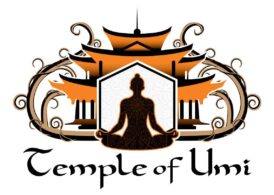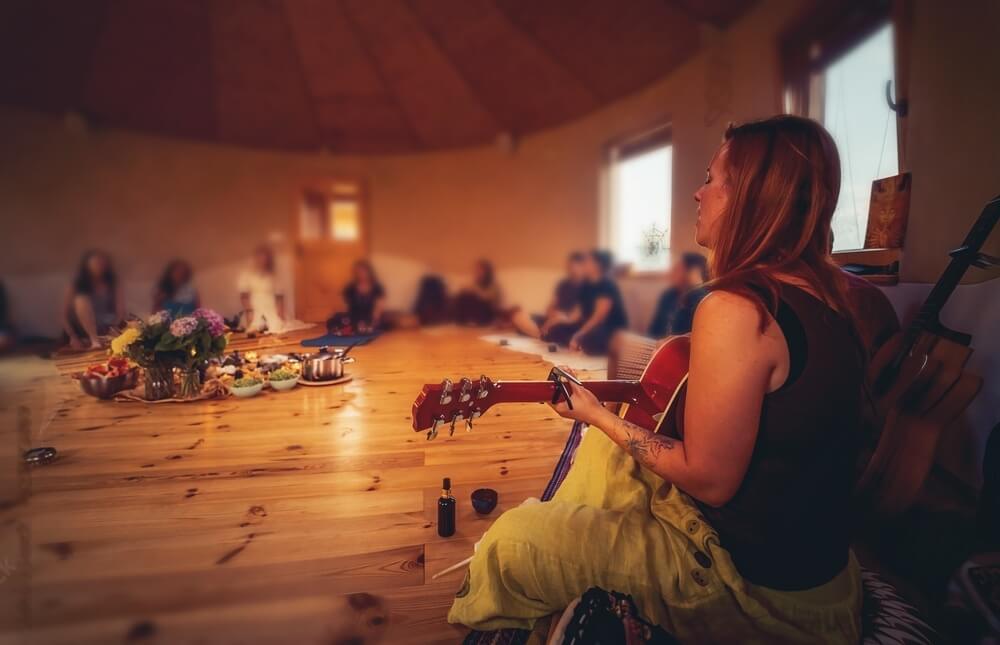Unlocking the Power of Ritualistic Practices for Spiritual Growth

By Temple of Umi

Table of Contents
Discover the transformative power of ritualistic practices and how they can deepen your spiritual journey. Learn about their benefits, significance, and different types in this comprehensive guide.
Ritualistic Practices: Unlocking Spiritual Potential
Ritualistic practices have been a part of human culture for centuries, spanning various religions, cultures, and spiritual traditions. These practices, whether ceremonial acts, sacred symbols, or collective group activities, are crucial in guiding individuals on their spiritual journey. In this blog post, we will explore the essence of ritualistic practices, their benefits, and how they can enhance your overall well-being and connection to the divine.
What are Ritualistic Practices?
Ritualistic practices refer to actions or ceremonies with a specific intention or purpose. These practices can be religious, spiritual, or personal, and they often involve repetition, sacred symbols, and a structured approach to time and space. Whether lighting candles, meditating, chanting, or performing a holy dance, these rituals align the practitioner with a higher consciousness or universal energy.
Rituals are seen in many cultures and religious practices. For example, rituals like baptism, communion, and prayer are central to the faith in Christianity. In Hinduism, rituals such as puja (a prayer ritual) and yajnas (sacrificial fire rituals) are practiced to honor deities and seek blessings. Similarly, indigenous cultures worldwide have ritualistic practices that connect them to nature, ancestors, and the spirit world. Learn more.
The Spiritual Significance of Ritualistic Practices
Ritualistic practices hold profound spiritual significance for individuals and communities. One of the primary purposes of rituals is to create a sacred space where one can connect with the divine, higher self, or universal consciousness. By engaging in ritualistic practices, you may experience a sense of alignment, grounding, and clarity.
Connection to the Divine: Rituals often bridge the gap between the physical and spiritual realms. They are designed to facilitate a deeper connection with a higher power or divine energy. Whether invoking deities, offering gratitude, or seeking guidance, ritualistic practices can serve as a medium through which the practitioner channels their intention and prayer.
Marking Important Life Events: Rituals mark essential milestones, such as birth, coming-of-age, marriage, or death. These practices help individuals navigate significant transitions, providing a sense of meaning, purpose, and closure. They create a space where individuals can honor their experiences and the energies that come with them.
Sacred Alignment and Transformation: Engaging in ritualistic practices can create an environment conducive to personal transformation. The structure and intentionality behind rituals can help the practitioner shift their energy, release old patterns, and realign with their highest potential. For example, meditation or sound healing can help cleanse the mind and body, opening up space for healing and growth. Learn more.
Benefits of Ritualistic Practices
Incorporating ritualistic practices into your daily or weekly routine offers many benefits. These practices are not only limited to spiritual enlightenment but can also lead to physical, emotional, and mental well-being. Let’s dive deeper into the transformative benefits of rituals.
Enhanced Focus and Clarity: One of the core benefits of ritualistic practices is the ability to help individuals stay focused and present. By performing a ritual regularly, your mind becomes conditioned to enter a meditative or intentional state, free from distractions. This clarity of mind can significantly enhance your decision-making, creativity, and overall mental well-being.
Stress Relief and Relaxation: Many ritualistic practices, such as yoga, breathing exercises, and sacred music, help calm the nervous system and reduce stress. These practices activate the parasympathetic nervous system, which is responsible for relaxation. Over time, engaging in rituals can help lower anxiety and foster a sense of peace.
Spiritual Growth and Alignment: Rituals can guide you on your spiritual path by deepening your understanding of the self and the universe. Regularly engaging in spiritual rituals invites transformation, healing, and alignment with your highest potential. These practices offer an opportunity to set intentions, connect with your inner wisdom, and live a more mindful and conscious life.
Improved Emotional Well-being: Rituals often incorporate self-reflection, gratitude, and emotional expression elements. These components help individuals process and release pent-up emotions. Whether through prayer, journaling, or offering a sacrifice, rituals provide a safe space for emotional release and healing, which can contribute to emotional stability and resilience.
Strengthening of Relationships: Many ritualistic practices are communal. They unite people for shared experiences, fostering community, belonging, and support. Whether attending a group meditation session, celebrating a sacred holiday, or performing a shared prayer, participating in rituals can strengthen relationships and create deeper bonds between individuals. Learn more.
Types of Ritualistic Practices
Ritualistic practices vary widely across cultures and spiritual traditions. Below are some examples of the most commonly practiced rituals and their significance:
Meditation and Mindfulness Rituals: Meditation is a powerful spiritual practice that can be performed individually or in groups. It involves sitting quietly and focusing the mind on a particular thought, object, or sound. Meditation rituals can include visualization, chanting, or breathing exercises to clear the mind and invite spiritual clarity.
Sacred Ceremonies and Rituals: In many spiritual traditions, ceremonies are performed to honor deities, ancestors, or significant events. These include prayer, offerings, and symbolic acts such as lighting candles or incense. Such rituals are performed daily in Hinduism, Buddhism, and other Rican spiritual practices.
Shamanic Rituals: Indigenous cultures, particularly those in South America and Africa, use shamanic rituals to connect with the spirit world. These practices often involve drumming, chanting, and using sacred plants to induce altered states of consciousness for healing and guidance.
Rites of Passage: Rites mark significant life transitions, such as birth, puberty, marriage, and death. These rituals serve as a way for individuals to transition from one stage of life to another. In many cultures, these rites are ceremonial and essential for spiritual and personal growth.
Seasonal and Cosmic Rituals: Many cultures honor the changing of the seasons and celestial events through rituals. These can include solstice ceremonies, harvest celebrations, and full moon rituals. These practices help individuals connect with the cycles of nature and the universe, cultivating a deeper understanding of their place in the world.

How to Incorporate Ritualistic Practices into Your Life
Incorporating ritualistic practices into your life doesn’t have to be complicated. Here are some practical ways to start:
- Create a Sacred Space: Set aside a space in your home where you can perform rituals, whether for meditation, prayer, or reflection. This space can be adorned with candles, incense, and symbols of personal significance.
- Start with Simple Practices: Begin with small, simple rituals like lighting a candle in the morning to set an intention for the day or engaging in a brief meditation session before bed.
- Commit to Regularity: Rituals are most effective when practiced consistently. Try to engage in ritualistic practices at least once weekly or daily to experience their full benefits.
- Reflect and Set Intentions: Use your rituals to reflect on your life, set intentions, and ask for guidance. Write down your thoughts and prayers in a journal to track your growth. Learn more.

Determination
Ritualistic practices are powerful tools for spiritual growth, personal healing, and emotional well-being. Incorporating these practices into your daily life can cultivate a deeper connection to the divine, enhance your mental clarity, and foster a sense of peace and purpose. Whether engaging in solitary meditation, participating in a community ceremony, or marking a significant life transition, ritualistic practices provide a transformative path to spiritual awakening.
Useful links
- What is Sacred Plant Medicine?
- Embark on a Journey of Transformation with Spiritual Healing
- Unveiling Healing Energy at the Temple of Umi
- 10 Energy Healing Techniques to Transform Your Life
- Where to get Sacred Plant Medicine Retreat in the USA
- Top Plant medicine retreats in the USA. Learn more.
- Cost of Plant Medicine Retreat: Balancing Cost and Experience. Learn more.
- What is trauma bonding?
- A Journey into the Healing Properties of Psychedelic Mushrooms. Learn more.
- Plant Medicine Retreat Georgia – Experience Spiritual Awakening
- Spiritual Retreats Georgia
- Shaman in America Exploration
- Shamanism – Shamanic healing
- Shaman Healing Guide
- Plant Medicine ceremonies near you in the USA
- Plant Medicine Experience
- DMT Journey, Benefits, and Side Effects
- Iowaska – What is it?
- Plant medicine retreats in Georgia
- Why massage is beneficial, according to a cardiologist.
- Are mushrooms truffles – What Is a Truffle?
- 11 Best Plant Medicine Retreats in the USA for Spiritual Healing
- What is Rapé?
- What is a Tincture?
- 5 Plant Medicine Retreats in California Worth Exploring
- Mcdonough Plant Medicine retreat
- Conley Plant Medicine retreat
- Whitesburg Plant Medicine retreat
- Brooks Plant Medicine retreat
- Sacred Plant Medicine Retreats in Georgia
- 5 Ayahuasca Retreats in California Worth Exploring
- 7 Best Aya Retreats in America. Click here.
- Mcdonough Ayahuasca retreat
- Conley Ayahuasca retreat
- Whitesburg Ayahuasca retreat
- Brooks Ayahuasca retreat
- Gay Ayahuasca retreat
- Williamson Ayahuasca retreat
- Orchard Hill Ayahuasca retreat
- Glenn Ayahuasca retreat
- Luthersville Ayahuasca retreat
- Shady Dale Ayahuasca retreat
- Bowdon Junction Ayahuasca retreat
- Sargent Ayahuasca retreat
- Greenville Ayahuasca retreat
- Lovejoy Ayahuasca retreat
- Winston Ayahuasca retreat
- Rutledge Ayahuasca retreat
- Moreland Ayahuasca retreat
- Molena Ayahuasca retreat
- Lebanon Ayahuasca retreat
- Good Hope Ayahuasca retreat
- Haralson Ayahuasca retreat
- An Inclusive List of Psychedelic Quotes
- Mount Ayahuasca retreat
- Grantville Ayahuasca retreat
- Pine Lake Retreat near
- Rydal Ayahuasca retreat
- Porterdale Ayahuasca retreat
- Waco Ayahuasca retreat
- Temple Ayahuasca retreat
- Bethlehem Ayahuasca retreat
- Jenkinsburg Ayahuasca retreat
- Adairsville Ayahuasca retreat
- Red Oak Ayahuasca retreat
- Woodbury Ayahuasca retreat
- Cassville Ayahuasca retreat
- Redan Ayahuasca retreat
- North Decatur Ayahuasca retreat
- Grantville Ayahuasca retreat
- Hillsboro Ayahuasca retreat
- Jackson Ayahuasca retreat
- Braselton Ayahuasca retreat
- Zebulon Ayahuasca retreat
- Flovilla Ayahuasca retreat
- Auburn Ayahuasca retreat
- Warm Springs Ayahuasca retreat
- Scottdale Ayahuasca retreat
- Lithia Springs Ayahuasca retreat
- Villa Rica Ayahuasca retreat
- Grayson Ayahuasca retreat
- Sunny Side Ayahuasca retreat
- Senoia Ayahuasca retreat
- Locust Grove Ayahuasca retreat
- Chamblee Ayahuasca retreat
- Fairburn Ayahuasca retreat
- Snellville Ayahuasca retreat
- Monticello Ayahuasca retreat
- Union City Ayahuasca retreat
- Tallapoosa Ayahuasca retreat
- Bremen Ayahuasca retreat
- Hampton Ayahuasca retreat
- Monroe Ayahuasca retreat
- Marble Hill Ayahuasca retreat
- Madison Ayahuasca retreat
- Dawsonville Ayahuasca retreat
- Felton Ayahuasca retreat
- Concord Ayahuasca retreat
- Mansfield Ayahuasca retreat
- Taylorsville Ayahuasca retreat
- Roopville Ayahuasca retreat
- Turin Ayahuasca retreat
- Franklin Ayahuasca retreat
- Clarkdale Ayahuasca retreat
- Talking Rock Ayahuasca retreat
- Jersey Ayahuasca retreat
- Kingston Ayahuasca retreat
- Bostwick Ayahuasca retreat
- North Metro Ayahuasca retreat
- Meansville Ayahuasca retreat
- Social Circle Ayahuasca retreat
- White Ayahuasca retreat
- Rhode Island Ayahuasca retreat
- Maryland Ayahuasca retreat
- Delaware Ayahuasca retreat
- New Jersey Ayahuasca retreat
- Connecticut Ayahuasca retreat
- Massachusetts Ayahuasca retreat
- Hampshire Ayahuasca retreat
- Pennsylvania Ayahuasca retreat
- New York Ayahuasca retreat
- Florida Ayahuasca retreat
- South Carolina Ayahuasca Retreat
- North Carolina Ayahuasca Retreat
- West West Virginia Ayahuasca retreat
- Virginia Ayahuasca retreat
- Ohio Ayahuasca retreat
- Alabama Ayahuasca retreat
- Mississippi Ayahuasca retreat
- Tennessee Ayahuasca retreat
- Kentucky Ayahuasca retreat
- IndianaAyahuasca retreat
- ILLINOIS Ayahuasca retreat
- Missouri Ayahuasca retreat
- Arkansas Ayahuasca retreat
- Louisiana Ayahuasca retreat
- Texas Ayahuasca retreat
- Oklahoma Ayahuasca retreat
- KansasAyahuasca retreat
- Ayahuasca retreats near me in Experiment.
- A wellness retreat in Georgia
- What is Ayahuasca?
- Embark on a Journey of Transformation with Spiritual Healing
- Unveiling Healing Energy at the Temple of Umi
- 10 Energy Healing Techniques to Transform Your Life
- Where to get Ayahuasca in the USA
- Top Ayahuasca retreats in the USA. Learn more.
- Cost of Ayahuasca Retreat: Balancing Cost and Experience. Learn more.
- What is trauma bonding?
- A Journey into the Healing Properties of Psychedelic Mushrooms. Learn more.
- Ayahuasca Retreat Georgia – Experience Spiritual Awakening
- Spiritual Retreats Georgia
- Shaman in America Exploration
- Shamanism – Shamanic healing
- Shaman Healing Guide
- Ayahuasca ceremonies Ayahuasca ceremonies near you in the USA
- Ayahuasca Experience
- DMT Journey, Benefits, and Side Effects
- Iowaska – What is it?
- Plant medicine retreats in Georgia
- Why massage is beneficial, according to a cardiologist.
- Are mushrooms truffles – What Is a Truffle?
- 11 Best Ayahuasca Retreats in the USA for Spiritual Healing
- What is Rapé?
- What is a Tincture?
- Where to find Ayahuasca near me
- Healing retreats USA
- Best Retreats USA









